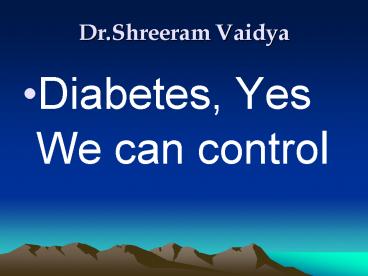Dr.Shreeram Vaidya - PowerPoint PPT Presentation
1 / 29
Title:
Dr.Shreeram Vaidya
Description:
Dr.Shreeram Vaidya Diabetes, Yes We can control What is Diabetes Mellitus? 1500 BC Ebers Papyrus First Described Diabetes Diabetes means to siphon .The most obvious ... – PowerPoint PPT presentation
Number of Views:192
Avg rating:3.0/5.0
Title: Dr.Shreeram Vaidya
1
Dr.Shreeram Vaidya
- Diabetes, Yes We can control
2
What is Diabetes Mellitus?
- 1500 BC Ebers Papyrus First Described Diabetes
- Diabetes means to siphon .The most obvious sign
of diabetes is excessive urination - Mellitus means sweet like a honey.
- It is a disorder of carbohydrate metabolism.
- In which bodys blood sugar (glucose)
- Level remains too high and causes problems.
- Insulin allows bodys cells to use glucose as a
fuel .
3
400 BC Sushrut
- Diabetes Causes
- Genetical
- Environmental
4
In 1889 Minkowski
- In 1889 Minkowski, with the German physiologist
Joseph von Mering (1849-1908), discovered that
dogs subjected to removal of their pancreas
develop the symptoms of diabetes, leading
Minkowski to postulate that the pancreas is the
site of secretion of an antidiabetic substance,
now known to be insulin.
5
Noble story of Insulin 1921
- DR Banting DR Best isolated insulin
- From pancreas of dog
- Insulin injected to a diabetic dog showed fall
in glucose levels
6
First insulin use Jan 11 1922
- On January 11, 1922, a 14-year-old with type 1
diabetes named Leonard Thompson received an
experimental injection at the Toronto General
Hospital that would change history. At the time,
type 1 diabetes was thought to be a death
sentence. Thompson's life was extended by an
additional 13 years using insulin.
7
Pancreas
- The pancreas has an exocrine portion that
secretes digestive enzymes that are carried
through a duct to the duodenum. The endocrine
portion consists of the pancreatic islets, Paul
Langerhans 1869 Described clusters of cells
(islets ) - In the pancreas which secrete Glucagon and
insulin.
8
(No Transcript)
9
(No Transcript)
10
Types Of Diabetes Mellitus
- Type I DM Insulin Dependent Diabetes
- 5-10 of diabetic patients. Usually affects
- Children.
- In this condition pancreas of the patients
- Produce practically no insulin. The patients
survival is dependent on external insulin.
11
Types of Diabetes cont
- Type II Diabetes Non Insulin Dependent
- Diabetes
- Causes
- Genetically
- Environmental
- Insulin is insufficient or insensitive
12
(No Transcript)
13
Diabetes in the World
Year2010
millions
Reference Wild S, Roglic G, Green A, Sicree R,
King H. Global prevalence of diabetes. Diabetes
Care. 2004 27(5) 1047-1053.
14
Symptoms of DM
- Excessively Thirsty (polydypsia)
- Passing a lot of urine (Polyuria)
- Excessive eating ( Polyphagia)
- Delayed wound healing
- Tiredness leg pains and numbness in the foot.
- Person may not have any symptom
- REGULAR CHECKING IS THE KEY
15
Diagnosis
- Fasting Glucose gt126mg
- Post Lunch (2Hrs) gt/ 200mg
16
Treatment
- Dietary restrictions
- Exercise Burns fats controls obesity
- Drugs Oral or insulin
- Once diabetic Diet restrictions and exercise
always required
17
Diet for Diabetics
- Avoid ice-creams, barfis,pedas,jams, jellies,
chocolates ,soft drinks, these items cause a
sudden rise in blood glucose. - Avoid also butter ,ghee, cream, paneer, deep
fried food, coconut. - Fruits to be avoided mangoes bananas , chickoos.
18
Diet cont
- Diet
- Lots of salad Carrots cabbage cucumber
- Chapati Bhakari (Rotala)
- Do not apply ghee or oil over roti
- Vegetables can be had in sufficient quantities
19
Sweet story
- For One Jelebi or Gulab Jamun
- Sugar present Approximately 20grams
- Capable of raising blood glucose at least to
400mgs but Your beta cells produce more insulin
and solve the problem . - But once they are sick they stop working and take
outsiders help i.e. may be insulin inj
20
BODY MASS INDEXBMI weight in Kg /HT in Meter
2
CLASSIFICATION ASIANS RISK COMORBIDIES
UNDER WT lt18.5 LOW
NORMAL RANGE 18.5-22.9 AVERAGE
OVERWT gt23 INCREASED
OBESE I gt25 MODERATE
OBSE II gt30 SEVERE
21
Wrong beliefs
- Diabetes can eat wheat but not rice
- Both wheat and rice raise the blood sugar to
similar extent . - It should not matter whether one takes wheat or
rice , as long as the total quantity - Is restricted .
22
Diabetic complications
- Hypoglycemia Blood glucose lt50mg
- Retinopathy screen of eye gets affected
- Neuropathy Found in 50 diabetic , Tingling
numbness, burning sensation (Feet) - Nephropathy Kidney damage
- Heart attacks 2-3 times higher than non
diabetics - Hyperglycemia Blood glucose above 140mg
23
Hypoglycemia Symptoms
- Increased appetite
- Weakness
- Sweating
- Restlessness
- Palpitation
- Giddiness
24
Hypoglycemia
- Predisposing Factors
- 1 Delaying or skipping meals
- Heavy alcohol consumption
- Decreased carbohydrate consumption
- Decreased in Insulin requirements
- (after elimination of stress)
25
DIABETIC FOOT
- Make checking your feet part of your daily
routine ,just like brushing your teeth. - Watch for red spots swelling ,cuts and calluses.
- Use mirror so that you can see heel ,sole
- Wash your feet with warm water every day .to
avoid burns test water temp with your elbow.
26
DIABETES YES WE CAN CONTROL
HDL Cholesterol (Good Cholesterol) gt45
LDL cholesterol Bad cholesterol) lt100mg
Triglycerides lt150mg
Waist measurement lt90cms for male
lt85cms for females
27
DIABETES YES WE CAN CONTROL
Fasting blood glucose 80-120mg
Post lunch (2Hours) lt140mg
HbA1c lt7
BMI 18.5-23
Cholesterol lt200mg
28
DIABETES YES WE CAN CONTROL
B.P. lt130/80 mmHg
Smoking Say no as it kills insulin producing cells
alcohol No as it will harm in the control
Say no to papad pickle Helps in controlling DM
29
Regular Tests
- Examination of Retina
- Urinary Microalbumin early detection of kidney
damage - Lipid profile
- HbA1c Quarterly
- B.P . Feet examination at each Doctor visit































